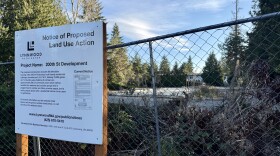Seattle residents could see expanded use of artificial intelligence in permitting, public safety, customer service and more as Mayor Bruce Harrell rolls out a new framework for how the city will incorporate the technology.
In a Thursday news conference, Harrell announced a new 26-page AI plan that includes guidelines for training employees, evaluating the effectiveness of AI tools and expanding the use of AI to a variety of city operations. The new plan also comes with an updated version of Seattle’s AI policy for employees.
“We are trying to be very intentional about positioning Seattle as a national leader in responsible artificial intelligence implementation,” Harrell said.
Seattle will use AI to improve a variety of city services, Harrell said. Various AI pilots are already underway, including a partnership with software company CivCheck in an effort to speed permitting times, and a partnership with enterprise software provider C3.ai, Microsoft and the Seattle Department of Transportation on a project that uses AI to analyze near-miss car incidents and identify dangerous streets.
Thursday’s press conference — which featured entrepreneurial jargon like “solutioning” and “upskilling” — was held at AI House, a co-working, event and “incubation” space on the Seattle waterfront launched through a public-private partnership earlier this year. The mayor addressed many of his comments to representatives from Seattle’s AI industry, stressing his desire to support the tech sector and harness local talent to help address civic issues.
“We have the second-biggest epicenter of AI talent, and our ability to activate that is key to our success,” said Seattle Chief Information Officer Rob Lloyd.
Seattle’s new AI plan alludes to “workforce transitions” and “organizational change” that will “inevitably create tensions” as the city’s embrace of AI “shifts the very nature of many jobs.”
Asked what city jobs might be replaced by AI, Harrell said it’s “premature” to go into specifics.
“When one door is closed in terms of a repetitive function, many more doors open for employment opportunity,” Harrell said, adding that the city will take a human-centered approach and work with labor groups “as we look at certain tasks that could possibly be replaced by AI.”
Lloyd said the goal is to empower city employees — not to replace them.
“People matter in making the most important decisions,” Lloyd said. “The critical decisions ultimately come back to the humans.”
Seattle was one of the first cities in the country to adopt generative AI guidelines in 2023. The updated 2025 policy is similar: It says all AI outputs must be reviewed by humans for accuracy and bias. (The jargon the city uses is “HITL,” short for “human in the loop.”)
If significant amounts of text generated by AI are used in a final product, the policy requires attribution to the relevant AI system. Here’s what the city suggests as a sample disclosure line:
“Some material in this brochure was generated using ChatGPT 4.0 and was reviewed for accuracy by a member of the Department of Human Services before publication.”
Lloyd said there “aren’t any penalties per se” for employees who violate the policy’s rules around disclosure.
Last month, Cascade PBS and KNKX published a two-part series about how city governments in Washington have used ChatGPT for a variety of policy and communication tasks. The series, based on thousands of pages of ChatGPT logs obtained through public records requests, was focused on Bellingham and Everett, but only because those cities were fastest to respond to records requests. Several Washington cities, including Seattle, are continuing to respond slowly in installments.
Lloyd said Seattle’s embrace of AI comes with lots of guardrails.
“There is a security process, there is privacy consideration, and as we go through that, we are also saying that we will enable AI to make the city of Seattle able to solve civic challenges,” Lloyd said.
The city’s updated AI policy includes prohibitions on the use of AI for monitoring and classifying individuals based on their behavior, for autonomous weapons systems and for consequential decisions.
All stories produced by Murrow Local News fellows can be republished by other organizations for free under a Creative Commons license. Image rights may vary. Contact editor@knkx.org for image use requests.







